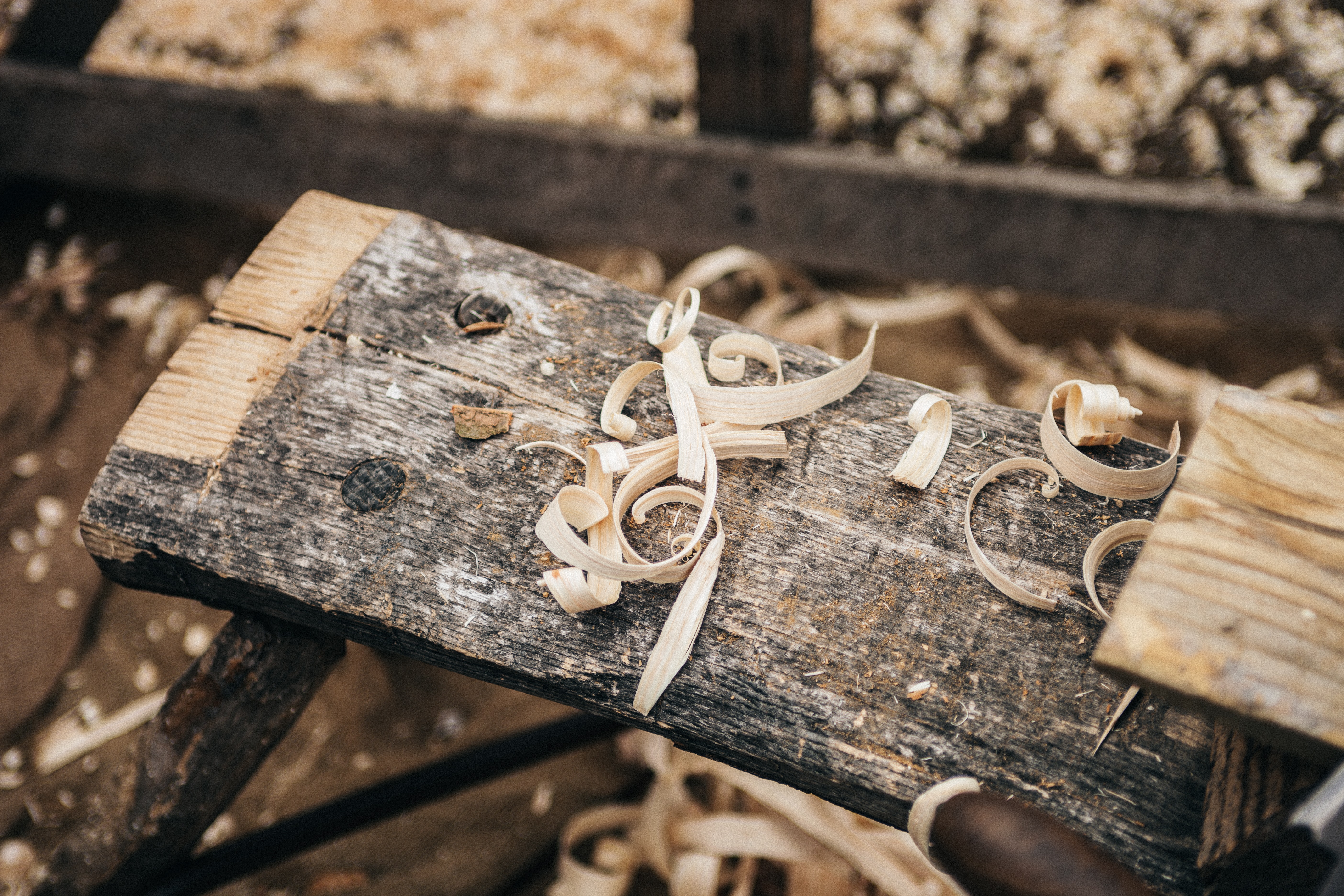Sausages, Fruits, Ships and More in German Idioms
 Idioms - in any language - can lead to hilarious laughter or confused looks, when they are translated literally into another language.
Idioms - in any language - can lead to hilarious laughter or confused looks, when they are translated literally into another language.
I was reminded of that last year in French-speaking Switzerland when a German with obviously limited French skills, express his frustration to his partner like this: “C'est me absolument saucisse!” (Lit. That's absolutely sausage to me.)
From his partner's confused look, followed by a loud chuckle, I concluded that she also understood the German meaning.
The German idiom “Das ist mir völlig Wurst” means “Das ist mir völlig egal” and translates as “I couldn't care less.” (Photo by Khamkhor on Unsplash)
Not surprisingly – Germans are fond of good sausages – and there are several other German, sausage-related idioms. While some idioms can be understood with a little imagination, others are impossible to guess.
And as no. 12 below shows, the meaning of some idioms can change over time. Here are 12 German idioms that you may not be familiar with.
1. Spiel nicht die beleidigte Leberwurst!
Idiom: Don't get bent out of shape, don't be a sorehead!
Literally: Don't play the offended liverwurst!
Explanation: Someone goes off in a huff and sulks because his feelings were hurt.
German: Jemand zieht sich zurück und schmollt, weil er glaubt, dass man ihn gekränkt hat.
Origin: Scholars in the Middle Ages supposedly assumed that a person's emotions - anger, sadness, love, etc. - were produced in the liver. So if someone got annoyed, it's his or her liver where the emotion came from.
Plus, there's another traditional story behind the "offended liverwurst". There, a butcher has all kinds of different sausages in a kettle. When the kettle boils, he takes out all the other sausages first, because they need a shorter cooking time. So, the liverwurst bursts in anger because it's the only one left in the kettle.
2. In den sauren Apfel beißen
Idiom: to bite the bullet
Literally: to bite into the sour apple (Photo by Khamkhor on Unsplash)
Explanation: To do something unpleasant, even though you find it hard to do.
German: Etwas Unangenehmes tun, obwohl es einem schwerfällt.
Origin: This expression is quite old. It comes up in one of Luther's letters where he writes: "Not lehrt in saure Äpfel beißen". (Hard times teach you to bite into sour apples.)
It means, that if you have no other choice, you'll just have to eat the sour apples. For example, if you want to pass your exam, you have to study for it.
3. Mit dem ist nicht gut Kirschen essen.
 Idiom: Best not to tangle with him.
Idiom: Best not to tangle with him.
Literally: Eating cherries with him is not pleasant. (Photo by Monika Grabkowska on Unsplash)
Explanation: He's hard to get along with.
German: Mit ihm kann man nicht gut auskommen.
Origin: For this expression there's an interesting origin. It dates back to the Middle Ages when cherry trees were not abundant and grew mostly just in monasteries or in gardens of the rich. Should you be passing a group of dignified gentlemen eating cherries, it could happen that they would chase you off and spit pits into your face to boot.
So, there are people that you wouldn't want to eat cherries with because they would treat you badly.
That could refer to people who think that they are better than you, and who are clearly contemptuous of who you are.
4. Wie man in den Wald hineinruft, so schallt es heraus.
Idiom: What goes around, comes around.
Literally: The way you call into the woods is the way it comes back. (Photo by Stepan Unar on Unsplash)
Explanation: The way you treat someone will determine their reaction.
German: So wie man jemanden behandelt, reagiert dieser auch darauf.
Origin: This expression probably goes back to the experience of hearing an echo in the woods - your voice bounces back after you've called to someone. The echo has a similar sound to what you called in the first place.
So more generally, if you shout at someone in anger, they often respond in anger too. If you don't treat others with respect, they may not respect you either.
5. Um den heißen Brei herum reden
 Idiom: to beat around the bush
Idiom: to beat around the bush
Literally: to talk around the hot porridge (Photo by Mae Mu on Unsplash)
Explanation: Avoid giving your honest and direct opinion.
German: Nicht ehrlich und direkt seine Meinung sagen.
Origin: Initially, the expression was: "Wie die Katze um den heißen Brei herumschleichen". (To tiptoe like a cat around the hot porridge.) The cat was of course looking for a cooler part of the porridge to start eating.
If you talk with someone who in the conversation tiptoes like a cat around the hot porridge, it means that they are afraid or reluctant to broach a certain subject.
6. Auf dem falschen Dampfer sein
Idiom: to bark up the wrong tree
Literally: to be on the wrong steamboat (Photo by ZEKERIYA SEN on Unsplash)
Explanation: To misunderstand something, be totally mistaken.
German: Etwas falsch verstehen, sich irren.
Origin: In the early 19th century, steamboat travel became increasingly popular in Germany, especially on the Rhine.
By 1850, steamship travel up and down the Rhine reached a million passengers. It was considered safer than travel by land, where raids and holdups were still common. By 1900, transatlantic crossings by steamship were well established.
If you now found yourself on the "wrong steamship", it was a real problem since the next harbor was often far off. The image of being on the "wrong steamship" suggests a grave error, that someone was way off in their thinking.
7. Lügen haben kurze Beine.
 Idiom: Your lies will catch up with you.
Idiom: Your lies will catch up with you.
Literally: Lies have short legs. (Photo by Matheus Vinicius on Unsplash)
Explanation: It's not worth it to lie because the truth will come out.
German: Es lohnt sich nicht zu lügen, denn die Wahrheit kommt immer heraus.
Origin: The image of a Lie having short legs suggests that someone with short legs simply cannot run that fast. So, the Truth with its longer legs (as we assume) can easily catch up to the Lie and expose the untruth.
8. Das ist Schnee von gestern.
Idiom: That's old hat. 
Literally: That is snow from yesterday.
Explanation: The matter is no longer important.
German: Die Sache ist nicht mehr von Bedeutung.
Origin: Possibly, this expression goes back to François Villon's "Ballade des dames du temps jadis", (Literally: Ballad of the Ladies of Long ago), which has the line "Mais où sont les neiges d’automne ?" (But where are the snows of autumn?)
When something is "snow from yesterday", it means that it's not new, not important, not interesting, not fresh.
9. Etwas mit in Kauf nehmen
Idiom: to put up with something
Literally: to accept something along with a purchase you've made
Explanation: To accept something because it's inevitable.
German: Etwas als unvermeidlich hinnehmen.
Origin: This expression comes from the traditional world of trade and commerce. It was often customary for merchants to offer the combination of a high quality product with one of lesser quality. Or, the combination of a product that was high in demand, with one not so in demand. If the buyer needed the former product, he would also accept to take the latter one.
In that sense, "etwas in Kauf nehmen", means that if you really want something, you would accept certain unavoidable disadvantages that come with it. Or, accept the risks of an action that you see as inevitable.
10. Wo gehobelt wird, da fallen Späne.
 Idiom: You can't make an omelet without breaking some eggs.
Idiom: You can't make an omelet without breaking some eggs.
Literally: Where a (carpenter's) plane is used, shavings will fall. (Image Credit: Clem Onojeghuo on Sawinery)
Explanation: A decision can also have disadvantages.
German: Eine Entscheidung kann auch Nachteile mit sich bringen.
Origin: This is a saying that originated in the world of trades, and points specifically to a carpenter's craft. When you "plane" ("hobeln"), you keep removing layers of wood until you smooth out the rough spots.
On the one hand, this expression can be used to justify ruthless or drastic behavior. On the other hand, it can also be a bit of wisdom: Something that has a lot of positives could also have disadvantages.
11. Aus dem Schneider sein
Idiom: to be out of the woods
Literally: to be no longer a tailor (Photo by Salvador Godoy on Unsplash)
Explanation: "To be out of the tailor" means that you have overcome a difficult situation, that the worst is behind you.
German: Aus dem Schneider sein, heißt eine schwierige Situation überwunden, das Schlimmste überstanden haben.
Origin: In the card game Skat, to be no longer a "tailor" (a profession of low standing in earlier times) means that you have more than half of the points needed to win (i.e. more than 30 points).
The expression "aus dem Schneider sein" is still commonly used in German. Actually, I've heard it multiple times used in connection with the COVID-19 crisis in German TV broadcasts. When will we all be "out of the tailor"?
12. Das passt wie die Faust aufs Auge.
 Idiom 1: They go together hand in glove.
Idiom 1: They go together hand in glove.
Idiom 2: They go together like chalk and cheese.
Literally: That fits like the fist on the eye.
Explanation: Things go together very well or they don't go together at all.
German: Etwas passt sehr gut zusammen, oder gar nicht.
Origin: The German expression "Das passt wie die Faust aufs Auge" seems to have a clear message: Having someone put their fist on your eye is not a good thing. However, curiously enough, this expression is mostly used to mean the opposite.
Initially, the idiom was "Das reimt sich wie die Faust aufs Auge" (That rhymes like the fist on the eye). For one, "Faust" and "Auge" do not rhyme. Plus, fist and eye don't go together, the fist is hard, the eye is soft and delicate.
But already early on, the idiom was used ironically to mean the opposite, that two things fit perfectly together. Though, the original meaning shows up too.
So, to clearly understand what someone is telling you, you have to pay attention to the context in which it is used, and/or the speaker's tone of voice. For example, what does it mean when your partner tells you that your shirt and scarf go together like "a fist on the eye"?!
Keeping a few idioms in your German language “quiver” will make your language more colorful and authentic. And maybe at the next post-coronavirus dinner party you'll contribute to some laughter and fun.
For the German idioms that are listed here, I consulted a number of different sites. You can find out more about these expressions, or find new ones in these: Redensarten.net, Redensartenindex.de, Geolino Wissen, Wortbedeutung Info.
(For French idioms see Apples, Butter, Rain and more in French Idioms.)
